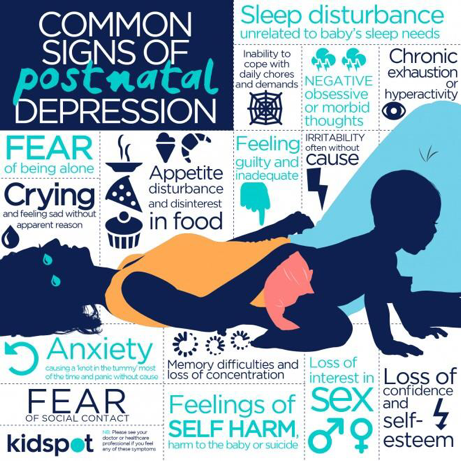Your Cart is Empty
Code "10OFF" Saves 10%!
We Ship Daily by 2pm + FREE US Shipping > $49 !
Code "10OFF" Saves 10%!
We Ship Daily by 2pm + FREE US Shipping > $49 !
Code "10OFF" Saves 10%!
We Ship Daily by 2pm + FREE US Shipping > $49 !
Code "10OFF" Saves 10%!
We Ship Daily by 2pm + FREE US Shipping > $49 !

January 12, 2018 3 min read
Maternal depression encompasses several conditions that may affect females anytime during their pregnancy and persist up to a year after giving birth. Postpartum Depression (PPD) is one type mothers and loved ones should look out for. Being depressed common and everyone feels at one point or period in their life. However, when these feelings last beyond a couple of days, it can interfere with the daily lives of the mother as well as the baby and result in weakened bonds.
Moms feel less willing to be active with their child and often do not sing, read, or play with them. They may also fail to care for the basic needs of their little one by ensuring the car seat it secure as well as making or following up on well visits for things like immunizations. PPD is a double edged sword where the child grows to not respond or interact with the mother too. It is possible this can plummet the mother even deeper into negative feelings and increase anxiety.
It is believed that as much as 10-20% of new mothers experience postpartum depression. It is often seen between 2-3 months after delivery, although it is not uncommon to see not long after the baby has been born. Those at particular risk of PPD are women of childbearing age under 24 that are sensitive during the first few months of delivery . Mothers with a history of substance or drug abuse and a personal or family history of anxiety and depression are also at risk. One thing to keep in mind is that maternal depression is still a chronic complication that can come and go. It is not always solely a problem that occurs within a certain timeframe after the baby is delivered. Mothers are always encouraged to express how they feel to others and their loved ones should monitor them whenever possible if they suspect the mother is going through PDD. 
There is no single face or subset of actions that can determine maternal depression as symptoms are not always the same for everyone. The amount of similar symptoms, the length, the frequency, and the intensity one goes through differ although there are signs to look out for:

Depression can be a scary shadow that is troublesome to get rid of, but it is definitely something that is treatable. Having a baby, whether it is the first or not, is a challenge for every mother where support is a must. Baltic Essentials Amber Rainbow Raw Milk can naturally treat postpartum depression in mothers. Amber is wonderful for providing pain relief and Lapis Lazuli is able to calm feelings of stress and anxiety. The rainbow necklace also contains pink rose quartz that can help mothers boost their self confidence while lowering stress and anger. Overall, the combination of the three is helpful in reducing the sadness that occurs during depression. The attractive necklace can make mothers begin to feel a difference not after wearing them, and the effects last a long time for months to come.
Please note, comments must be approved before they are published

March 08, 2025 2 min read
Read MoreFor babies and young children, we offer a wide range of products that contain all natural Baltic Amber, Hazelwood, and other elements...
There are a variety of intended benefits, such as relief for inflammation, gut pain, and even emotional ailments. Check out our selection below!
All Products Asthma & Breathing Separation Anxiety Anger & Stress Stress, Anxiety, ADHD Emotional Support
For babies and young children, we offer a wide range of products that contain all natural Baltic Amber, Hazelwood, and other elements...
There are a variety of intended benefits, such as relief for inflammation, gut pain, and even emotional ailments. Check out our selection below!
All Products Asthma & Breathing Separation Anxiety Anger & Stress Stress, Anxiety, ADHD Emotional Support
For Older Children and Pre-Teens, we offer a wide range of products that contain all natural Baltic Amber, Hazelwood, and other elements...
There are a variety of intended benefits, such as relief for inflammation, gut pain, and even emotional ailments. View our selection of Pre-Teens inventory below!
All Products Asthma & Breathing Sadness & Depression Anger & Stress Stress, Anxiety, ADHD Emotional Support
We offer a wide range of products that contain all natural Baltic Amber, Hazelwood, and other elements...
There are a variety of intended benefits, such as relief for inflammation, gut pain, and even emotional ailments. View our selection of inventory below!
All Products Asthma & Breathing Sadness & Depression Anger & Stress Stress, Anxiety, ADHD Emotional Support